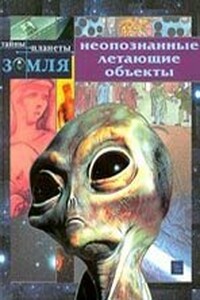Английский язык для специальных и академических целей: Международные отношения и зарубежное регионоведение. Часть 1 - [58]
12. You are always referring to yourself as a patriot. I want you to stop doing it. WISH I ___________________________________________ as a patriot.
13. Health Minister said today he didn't intend to resign. INTENTION
Health Minister said today he __________________________________________.
14. I'm certain he isn't responsible for the error; he looks too experienced. CANNOT He _____________________________for the error; he looks too experienced.
Unit III. EU at the Crossroads
EAP CORNER
Skim the introduction to the article and find sentences which contain answers to the questions:
1. When and why did Great Britain find itself in the European Union?
2. Why does it appear to want out twenty years later?
Unit III. EU at the Crossroads
3. What are Britain's options outside the EU?
Do you think the answers sum up the main idea of the introduction or of the whole article?
Now look through the rest of the text (‘Almost by accident') to find out more:
1. What can start the process of Great Britain leaving the EU?
2. How many different situations of its exit are analysed?
3. What is the position of the three British leading parties on the EU membership?
4. What makes the outcome of the referendum uncertain?
Which of the words helped you to do it quickly and why?
Trigger, referendum, manifesto, scenario, pressure, Labour, trade unions, Tory, UKIP, poll, Eurosceptic, vote, unpredictable, single market
Did you find the answers at the beginning of the paragraphs? At the end? In the middle?
Now skim the rest of the Article ‘Making the Break' in the Reader and decide what message the author is trying to get across to his readers. What do you anticipate?
1. Britain is far better off in the EU.
2. The ‘marriage contract' between Britain and the EU needs reconsidering,
3. Britain's exit from the EU is fraught with serious consequences.
MAKING THE BREAK (1) http://www.economist.com/news/briefing/21567914-how-britain-could-fall-out-european-union-and-what-it-would-mean-making-break
How Britain could fall out of the European Union, and what it would mean Dec 8th 2012 | From the print edition
BRITAIN has never been too keen on tying the knot with Europe. It sat aside in the 1950s as Germany, France, Italy and the Benelux countries forged a single market in coal and steel, which became a broader common market. It eventually joined, in 1973, largely because Europe seemed to be where the money was. Britons still think of their relationship with Europe as a transaction. But their feelings about the costs and benefits of membership have changed utterly.
Unit III. EU at the Crossroads
Europe is no longer the thriving economic club that Britain joined 40 years ago. The euro-zone crisis has exposed the lack of dynamism in much of Europe (though Britain itself is hardly booming) and the British also feel sidelined, as countries that use the single currency are pulled more tightly together. Britons have come to associate the EU with the uncontrolled immigration of Poles and other east Europeans, seemingly to every village. Although many political leaders are determined to stop it happening, a British exit from Europe is coming to seem ever more possible.
If Britain falls out of the EU, it may find itself completely outside the single market. It might try to stay in the European Economic Area (EEA), a free-trade club that also includes Iceland and Norway. Or it could leave both the EU and the single market, but attempt to recreate a free-trade relationship through bilateral agreements. In this article we explain what each would mean for British business and the economy. But, first, how could an exit happen?
The likeliest trigger is a referendum. David Cameron, Britain's prime minister, is under enormous pressure to call one from his own Conservative Party, which dominates Britain's coalition government. Last year 81 Tory MPs voted for a referendum on Britain's EU membership. “It's moved very fast,” says John Redwood, a veteran critic of the EU. “People used to call me an extreme Eurosceptic. Now I'm a moderate.”
Truly fervent Eurosceptics seek a referendum because they want to quit the EU. Other Tories want one to spike the guns>60> of the UK Independence Party (UKIP), which campaigns for an exit. UKIP, a once-minor party that came second to Labour in two by-elections on November 29th, takes votes from all parties but most terrifies Conservative MPs. If the party does well in the next European Parliament elections, due in 2014, the pressure on Mr. Cameron will increase.
He is already bending. In September the prime minister hinted that Britons might have an opportunity to give “fresh consent” to their country's place in a looser union — a rather fuzzy suggestion that is unlikely to dampen calls for a starker question. Some Tory cabinet ministers now expect the party to include a promise of an “In-Out” referendum on Europe in its 2015 generalelection manifesto.
That might persuade Labour to follow suit — which is the second referendum scenario. Although the party is broadly pro-European, some Labour strategists have been urging Ed Miliband, its leader, to promise a referendum all the same, chiefly to pile pressure on Mr. Cameron but also to stay on the right side of public opinion. “Whatever our position on Europe, we cannot be seen as the anti-referendum party,” a senior Labour figure says.
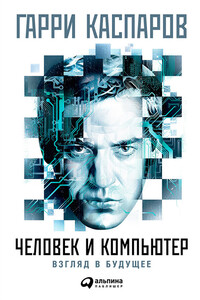
Сегодня искусственный интеллект меняет каждый аспект нашей жизни — ничего подобного мы не видели со времен открытия электричества. Но любая новая мощная технология несет с собой потенциальные опасности, и такие выдающиеся личности, как Стивен Хокинг и Илон Маск, не скрывают, что видят в ИИ возможную угрозу существованию человечества. Так стоит ли нам бояться умных машин? Матчи Гарри Каспарова с суперкомпьютером IBM Deep Blue стали самыми известными в истории поединков человека с машинами. И теперь он использует свой многолетний опыт противостояния с компьютерами, чтобы взглянуть на будущее искусственного интеллекта.
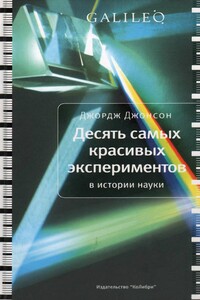
В наше время научные открытия совершатся большими коллективами ученых, но не так давно все было иначе. В истории навсегда остались звездные часы, когда ученые, задавая вопросы природе, получали ответы, ставя эксперимент в одиночку.Джордж Джонсон, замечательный популяризатор науки, рассказывает, как во время опытов по гравитации Галилео Галилей пел песни, отмеряя промежутки времени, Уильям Гарвей перевязывал руку, наблюдая ход крови по артериям и венам, а Иван Павлов заставлял подопытных собак истекать слюной при ударе тока.Перевод опубликован с согласия Alfred A, Knopf, филиала издательской группы Random House, Inc.
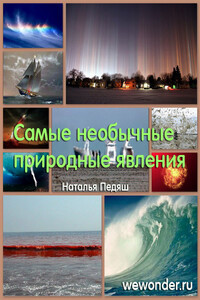
Самые необычные природные явления: брайникл, фата-моргана, прибрежное капучино, огни Святого Эльма, шаровая молния, огненная радуга, огненный вихрь, двояковыпуклые облака, красные приливы, световые столбы, волны-убийцы.
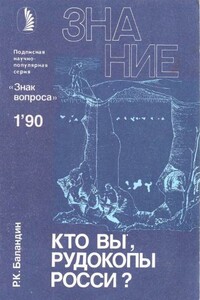
Нам предстоит познакомиться с загадочным племенем рудокопов, обитавших около 2–4 тысячелетий назад в бассейне реки Россь (Западная Белоруссия). Именно этот район называл М. В. Ломоносов как предполагаемую прародину племени россов. Новые данные позволяют более убедительно обосновать и развить эту гипотезу. Подобные знания помогают нам лучше понять некоторые национальные традиции, закономерности развития и взаимодействия культур, формирования национального характера, а также единство прошлого и настоящего, человека и природы.http://znak.traumlibrary.net.
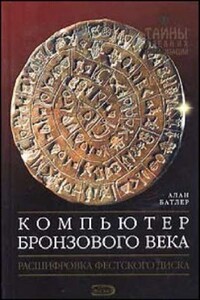
Созданный более 4000 лет назад Фестский диск до сих пор скрывает множество тайн. Этот уникальный археологический артефакт погибшей минойской цивилизации, обнаруженный на острове Крит в начале XX века, является одной из величайших загадок в истории человечества. За годы, прошедшие со дня его находки, многие исследователи пытались расшифровать нанесенные на нем пиктограммы, однако до настоящего времени ни одна из сотен интерпретаций не получила всеобщего признания.Алан Батлер предлагает собственную научно обоснованную версию дешифровки содержимого Фестского диска.
